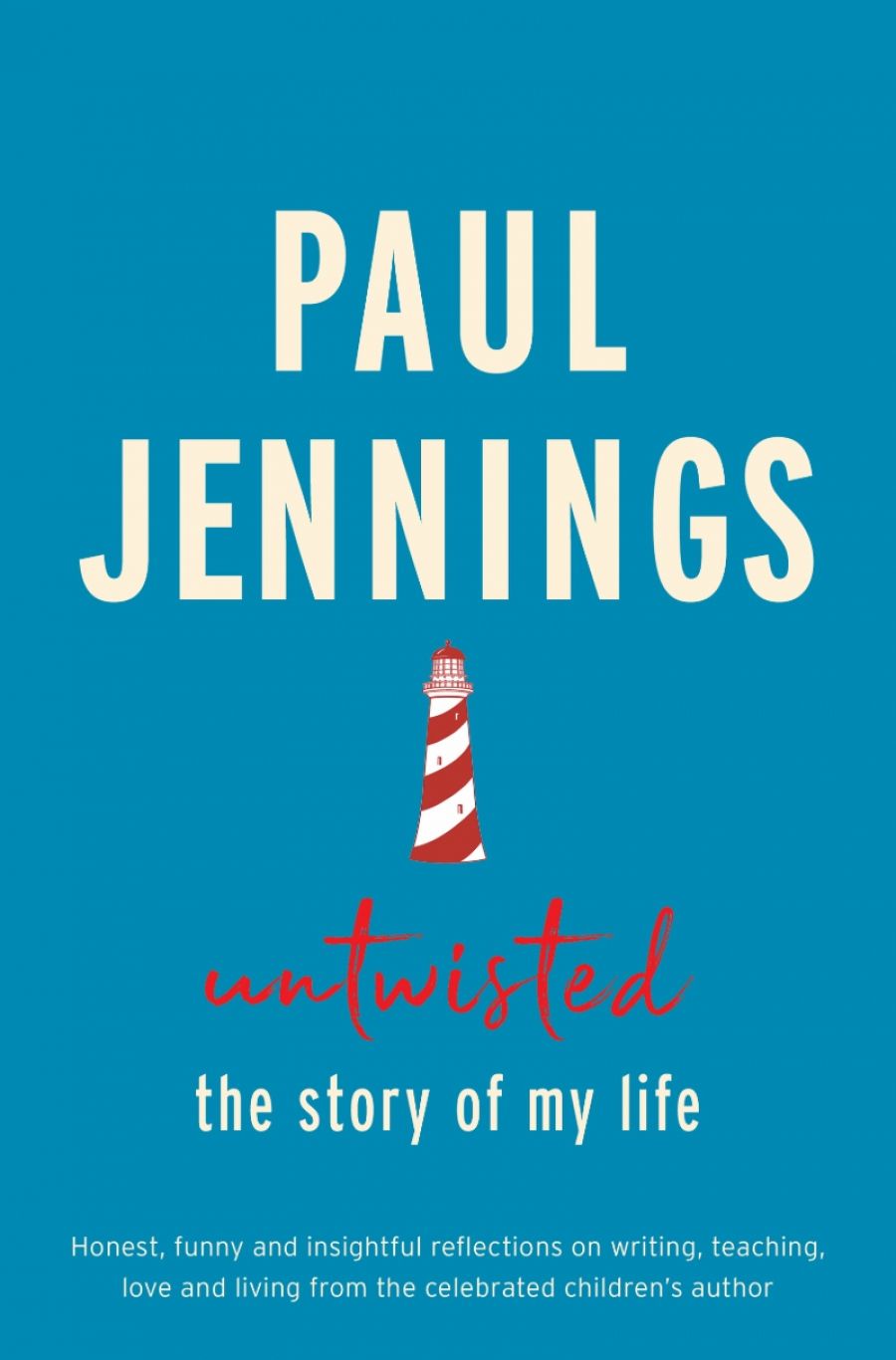
- Free Article: No
- Contents Category: Memoir
- Review Article: Yes
- Article Title: Winning the lottery
- Article Subtitle: Paul Jennings’s unusual new memoir
- Online Only: No
- Custom Highlight Text:
Paul Jennings’s literary career can be traced back to three whispered words from the author Carmel Bird, who taught him writing at an evening class in Melbourne in 1983. ‘You are good,’ she told him. Jennings was an unpublished forty-year-old at the time, yet within two years Penguin had launched his first short story collection, Unreal!
- Grid Image (300px * 250px):

- Book 1 Title: Untwisted
- Book 1 Subtitle: The story of my life
- Book 1 Biblio: Allen & Unwin, $34.99 hb, 336 pp
- Book 1 Readings Link: booktopia.kh4ffx.net/OG1oW
Untwisted, like Jennings’s stories, is both conventional and unusual at the same time. Written in conversational, direct, unchallenging prose, the book might be appropriate for adolescents or even younger but for a few mild adult jokes. On the other hand, Jennings takes an unexpectedly ‘meta’ approach. On several occasions he introduces an anecdote by first explaining what storytelling devices he will employ, the tense he will use, and why. To set up one boyhood tale, he writes:
I’ve chosen to tell the incident in the present tense and third person. And I’ve called the main character ‘the boy’ rather than Paul. It somehow feels right for this piece. Or maybe I’m protecting myself from feelings that are still raw. I was five years old when this happened.
It is odd to have this spelled out, but the reader does feel as if they are sitting next to Jennings as he thinks out loud, negotiating the unfamiliar business of writing memoir.
In 1949, at the age of six, Jennings moved with his parents and younger sister from southern England to suburban Melbourne. From his early years onwards, he endured a difficult relationship with his father, portrayed here as an angry, repressed, petty, and uncouth man whose behaviour towards his son bordered on abusive. This can be painful reading: Jennings recalls his father deliberately giving him an electric shock to ‘teach [him] about electricity’. In a sorrowful passage, he catches his father looking at him with ‘an expression like that of someone who had just seen their worst enemy win the lottery’.
His father and much-loved mother are the only family members to whom Jennings takes a particularly close lens – his sister, wives, and friends are mostly peripheral figures in the narrative. He also excuses himself from writing about his six children, explaining that ‘they would like to be known for their own achievements’. While this is fair and admirable, had he included his own philosophies and experiences of parenting, in the wake of his treatment by his father, the book may have had a more symmetrical emotional arc.
Jennings became a teacher at the age of nineteen, and predominantly worked with children with special needs and in what he describes as a ‘prison school’, where violence was common. Anyone seeking the roots of Jennings’s characters, often outsiders or loners, might find them in this period of his life. He observed the struggles of young people on the fringes of the education system in the 1960s and 1970s. More than once in Untwisted, Jennings expresses his sympathy for the child who wanders alone in the playground at lunchtime. Factor in the alienation he experienced as an English child in suburban Australia in the 1950s, and the origins of underdog characters in memorable stories such as ‘Without a Shirt’, ‘Lucky Lips’, and ‘Spaghetti Pig-out’, become clear.
To balance its sombre sections, Untwisted also offers many entertaining recollections from Jennings’s childhood, his writing life, and the classroom. Jennings writes of first-hand experience of some significant moments in Australian history. He was, for example, an usher when the American evangelist Billy Graham drew nearly 150,000 people to the Melbourne Cricket Ground in 1959 (Jennings was a devout Christian as a young adult). At this event Jennings had an amusing run-in with the famous left-wing activist Albert Langer. In 1967 he attended the protest outside Pentridge Prison against the execution of Ronald Ryan, the last person to be hanged in Australia.
Jennings’s writing career exploded after the publication of Unreal!, with Unbelievable!, Quirky Tails!, and Uncanny! all following in the mid-1980s. His books became well-thumbed treasures in countless Australian households. For those of us for whom Jennings was a gateway to books and reading, this memoir has a somewhat paternal feel, accentuated by his gentle style and innate modesty.
However, for many readers, one of the charms of his books was the rich, colourful, and mysterious cover illustrations (many by Keith McEwan). It is a minor disappointment that Jennings does not include the background to, or at least reflections on, this imagery. Elsewhere, a few pages get bogged down in educational administration, and towards the end, reading about this millionaire’s struggles with his fleet of classic cars is not particularly engaging.
Untwisted contains many musings on the mechanics of writing: economy of language, word choice, story structure, and dialogue. One of the most interesting of these comes when he declares that exclamation marks are a sign of ‘weak writing’ and that he never uses them. This might seem surprising given the dramatic exclamation marks in the aforementioned book titles (which were included against Jennings’s wishes). That punctuation choice was an understandable commercial move to emphasise the zany, the wacky, and the bizarre in his stories. But those exclamation marks belie the fact that alongside all the fun to be had, there is an underlying melancholy, grief, and loneliness affecting many of his characters. It is his ability to combine these things with absurd (often toilet) humour that makes Jennings so compelling.
Overall, Untwisted achieves this, too: a delight in the peculiar and the whimsical is balanced by genuine, and often moving, emotional depth. In the words of Carmel Bird, Paul Jennings is good.


Comments powered by CComment